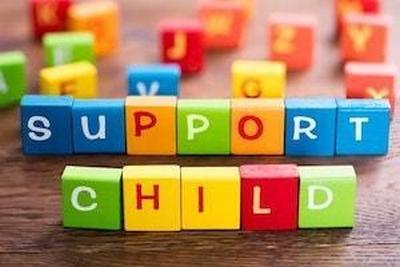Free Initial Consultations
 630-580-6373
630-580-6373With offices in Naperville, Joliet, Wheaton, Plainfield & Chicago
 One of the most difficult conversations you may ever have with your child is the announcement that you and your spouse are ending your marriage. Children feel the impact of divorce perhaps as extensively as their parents, and how they react will depend on their age, personality, and unique circumstances. These young people will feel a range of emotions, including sadness, anger, anxiety, and surprise.
One of the most difficult conversations you may ever have with your child is the announcement that you and your spouse are ending your marriage. Children feel the impact of divorce perhaps as extensively as their parents, and how they react will depend on their age, personality, and unique circumstances. These young people will feel a range of emotions, including sadness, anger, anxiety, and surprise.
If you are divorcing in Illinois and you have decided that the time is right to tell your child, there are a few things you and your spouse can do to help them endure these difficult times.
Initiating the Conversation
When you are certain of most plans, sit your kids down and tell them about your decision to divorce. It is best if both parents are present when breaking the news, so you can present a united front in your determination that divorce is for the best of the family. Practice in advance if possible, because you are better able to anticipate and address your emotions before your children witness them. Expel negative feelings of anger, guilt, or blame when initiating the conversation.
 Divorce can be emotionally draining and complex, but having a skilled lawyer on your side can make the experience less taxing. An Illinois divorce attorney will represent your interests in court to ensure protection of your rights under the law. Hence, your relationship with your attorney is important: Finding the right fit with a divorce lawyer is key to making the process as smooth as possible. You would not buy a car or home without conducting some research, and it is just as essential to do your homework when looking for an attorney. Consider the following factors when searching for a legal professional.
Divorce can be emotionally draining and complex, but having a skilled lawyer on your side can make the experience less taxing. An Illinois divorce attorney will represent your interests in court to ensure protection of your rights under the law. Hence, your relationship with your attorney is important: Finding the right fit with a divorce lawyer is key to making the process as smooth as possible. You would not buy a car or home without conducting some research, and it is just as essential to do your homework when looking for an attorney. Consider the following factors when searching for a legal professional.
Where to Look
You may see ads on TV or online offering divorce services, but there are other resources to consider when looking for a divorce lawyer. If you have friends or family members who have been through the process, ask for a referral if those individuals were pleased with the attorney they used. Plus, you can also consult with state or local bar associations that maintain a lawyer referral service. These databases are typically organized by area of practice, so you know whether an attorney handles divorce cases.
 A court will enter a child support order as part of the divorce process in Illinois, but it is important for both parents to understand how the law provides for enforcement of payment provisions. There are a number of protections in place intended to ensure that financial support never becomes a problem for a parent caring for a minor child. Moreover, there may be harsh consequences for someone who tries to shirk his or her responsibilities.
A court will enter a child support order as part of the divorce process in Illinois, but it is important for both parents to understand how the law provides for enforcement of payment provisions. There are a number of protections in place intended to ensure that financial support never becomes a problem for a parent caring for a minor child. Moreover, there may be harsh consequences for someone who tries to shirk his or her responsibilities.
An Illinois child support lawyer can help you understand your rights and assist in enforcement efforts. Consult with a legal professional if you are facing challenges in dealing with your ex-spouse.
Illinois Income Withholding for Support Act
This law, which applies to all child support orders, requires payments to be automatically deducted from the payor’s income and forwarded to the recipient parent. The State Disbursement Unit (SDU) is the agency of the Illinois government which manages this garnishment process. Unless you have agreed otherwise with your ex-spouse and the court approves an alternative plan, child support enforcement is administered by the SDU.
 It is common for engaged couples to make purchases before their wedding day, with the intent that the two will use these items when they are united in marriage. Often, soon-to-be spouses will invest in real estate or other high-ticket items. However, when the unfortunate happens and the once-happy couple decides to divorce, there are often questions regarding this property and how it will be equitably divided during the divorce process. The Illinois divorce statute speaks to exactly this situation, defining these items as purchases “in anticipation of marriage.” You should discuss the specifics of any items you bought as a couple before your wedding day, especially since there have been recent changes to Illinois divorce law that became effective in 2016.
It is common for engaged couples to make purchases before their wedding day, with the intent that the two will use these items when they are united in marriage. Often, soon-to-be spouses will invest in real estate or other high-ticket items. However, when the unfortunate happens and the once-happy couple decides to divorce, there are often questions regarding this property and how it will be equitably divided during the divorce process. The Illinois divorce statute speaks to exactly this situation, defining these items as purchases “in anticipation of marriage.” You should discuss the specifics of any items you bought as a couple before your wedding day, especially since there have been recent changes to Illinois divorce law that became effective in 2016.
Marital Versus Non-Marital Property
Purchases made in anticipation of marriage come into play in the context of marital and non-marital property. Before a court will make an equitable distribution of property to spouses, it is first necessary to establish the classification of all assets. Then, a judge can divide marital assets and make a ruling that respective spouses can keep non-marital property. Under Illinois law, the spouses may also agree on the classification of marital versus non-marital property.
 Signs on CTA vehicles and other heavily trafficked areas around town are common. They may state, “Low Cost Divorce, Just $99 Flat Fee,” or other similar text. At first glance, a “low cost divorce” might seem like a good idea, especially if you and your spouse can agree on most factors involving your divorce. However, there is a lot of information these ads leave out, including hidden fees that make your total cost much higher than the $99 as advertised. As a warning about low cost divorce in Illinois, consider a few additional factors these firms will not tell you upfront.
Signs on CTA vehicles and other heavily trafficked areas around town are common. They may state, “Low Cost Divorce, Just $99 Flat Fee,” or other similar text. At first glance, a “low cost divorce” might seem like a good idea, especially if you and your spouse can agree on most factors involving your divorce. However, there is a lot of information these ads leave out, including hidden fees that make your total cost much higher than the $99 as advertised. As a warning about low cost divorce in Illinois, consider a few additional factors these firms will not tell you upfront.
Court Filing Fees Not Included
The fee you pay to a firm that handles low cost divorce is typically applied to the services provided. There are additional fees for filing the proper paperwork with the court clerk to initiate the dissolution of marriage proceedings. Depending on your circumstances, there may be other court costs which are not disclosed until after you have already started the process.
 Under Illinois law, divorcing parents may present a mutually agreed plan for decision-making responsibilities and a schedule for parenting time regarding minor children. The statute encourages parents to agree by including a caveat if they cannot cooperate: The court will make decisions regarding parenting time, taking control out of the hands of a divorcing couple. Therefore, it is important to at least try to come to an agreement on parenting time in the plan you submit to the court as part of the divorce process. An Illinois divorce lawyer can assist you in covering the primary factors to consider for allocation of parenting time.
Under Illinois law, divorcing parents may present a mutually agreed plan for decision-making responsibilities and a schedule for parenting time regarding minor children. The statute encourages parents to agree by including a caveat if they cannot cooperate: The court will make decisions regarding parenting time, taking control out of the hands of a divorcing couple. Therefore, it is important to at least try to come to an agreement on parenting time in the plan you submit to the court as part of the divorce process. An Illinois divorce lawyer can assist you in covering the primary factors to consider for allocation of parenting time.
Activities Scheduling
During the school year, there is more regularity in activities, but your parenting time should take all contingencies into account. You will need to consider how to handle plans if one parent must travel for work or has a variable schedule, such as healthcare workers, law enforcement, and others that may be called into work unexpectedly.
 Children are impacted by a divorce just as much as their parents, but their situation is also unique due to their age. Minors cannot represent themselves in court and are often too young to understand their own best interests, which is the paramount factor in determining parental responsibility allocation. In a contested case or under other circumstances, a judge may decide to appoint an advocate for the child. Under Illinois law, the court has three options:
Children are impacted by a divorce just as much as their parents, but their situation is also unique due to their age. Minors cannot represent themselves in court and are often too young to understand their own best interests, which is the paramount factor in determining parental responsibility allocation. In a contested case or under other circumstances, a judge may decide to appoint an advocate for the child. Under Illinois law, the court has three options:
Each of these positions carries its own powers and capabilities, so it is important to understand the role of the guardian ad litem if one has been appointed for minor children in your divorce.
Guardian Ad Litem (GAL) Defined
The GAL is a court-appointed official who acts as the “eyes and ears of the court” in different matters involving children, including divorce. A judge cannot observe children in their own environment, going about their daily routine, which is instrumental in making a parental responsibility determination that aligns with the best interests of a minor child. The GAL is appointed to conduct this type of investigation and report back to the court on what he or she discovers.
 Absent an agreement of divorcing parties regarding their assets, a court will make an equitable distribution of property to each spouse as part of the dissolution of marriage process in Illinois. However, before dividing up the items, it is necessary to establish which assets are considered “marital” and “non-martial” under state law. While the distinction may be clear-cut for certain assets, the line between the two types of property may not be as obvious for others. There are rules that establish the difference between marital and non-marital property in Illinois, so discuss your specific circumstances with an attorney that has experience in property divisions in Illinois divorces.
Absent an agreement of divorcing parties regarding their assets, a court will make an equitable distribution of property to each spouse as part of the dissolution of marriage process in Illinois. However, before dividing up the items, it is necessary to establish which assets are considered “marital” and “non-martial” under state law. While the distinction may be clear-cut for certain assets, the line between the two types of property may not be as obvious for others. There are rules that establish the difference between marital and non-marital property in Illinois, so discuss your specific circumstances with an attorney that has experience in property divisions in Illinois divorces.
Assets Included in Marital Property
The general rule is that all property acquired by spouses during their marriage is considered marital property. Hence, the property will be equitably divided throughout the divorce process. A court does not look to actual title and name associated with an asset in determining whether it qualifies as marital property. Typically, any item you come by during marriage will be included in marital property, including:
 The Illinois Marriage and Dissolution of Marriage Act defines the allocation of parental responsibilities when parents of minor children divorce, stating that it includes both parenting time and decision-making regarding the child. The law covers various aspects of raising a child, like choices involving education, healthcare, and religion. The Illinois Marriage and Dissolution of Marriage Act also refers to extracurricular activities, which might be obvious interests and pastimes the child enjoys. However, many parents overlook the importance of online activities in a child’s life—which should certainly be considered alongside sports, camp, music lessons, and other pursuits.
The Illinois Marriage and Dissolution of Marriage Act defines the allocation of parental responsibilities when parents of minor children divorce, stating that it includes both parenting time and decision-making regarding the child. The law covers various aspects of raising a child, like choices involving education, healthcare, and religion. The Illinois Marriage and Dissolution of Marriage Act also refers to extracurricular activities, which might be obvious interests and pastimes the child enjoys. However, many parents overlook the importance of online activities in a child’s life—which should certainly be considered alongside sports, camp, music lessons, and other pursuits.
When working on the parenting plan that is required by law, talk with your divorce lawyer about online activities as part of parental responsibilities in Illinois.
Time Spent Online Per Day or Week
 There are several matters that a court will determine during the divorce process in Illinois, and spousal maintenance is among the top issues that a judge will decide. The term spousal maintenance refers to the financial support that one ex-spouse pays to the other, commonly known as “alimony.”
There are several matters that a court will determine during the divorce process in Illinois, and spousal maintenance is among the top issues that a judge will decide. The term spousal maintenance refers to the financial support that one ex-spouse pays to the other, commonly known as “alimony.”
The first consideration that a court will review is whether spousal maintenance is appropriate under the circumstances; Illinois law lists a number of different factors to weigh, including income, earning capacity, property, and duration of the marriage.
One point that is often hotly contested is when one spouse’s role is focused primarily on domestic duties during the marriage. Two factors under the Illinois divorce statute speak to exactly this type of situation.
“Homemaker” Contribution
Statutory law requires a court to look at whether one spouse sacrificed his or her career opportunities in favor of staying at home to focus on maintaining the household and/or raising children. There are a couple of rationales to support the homemaker contribution:
